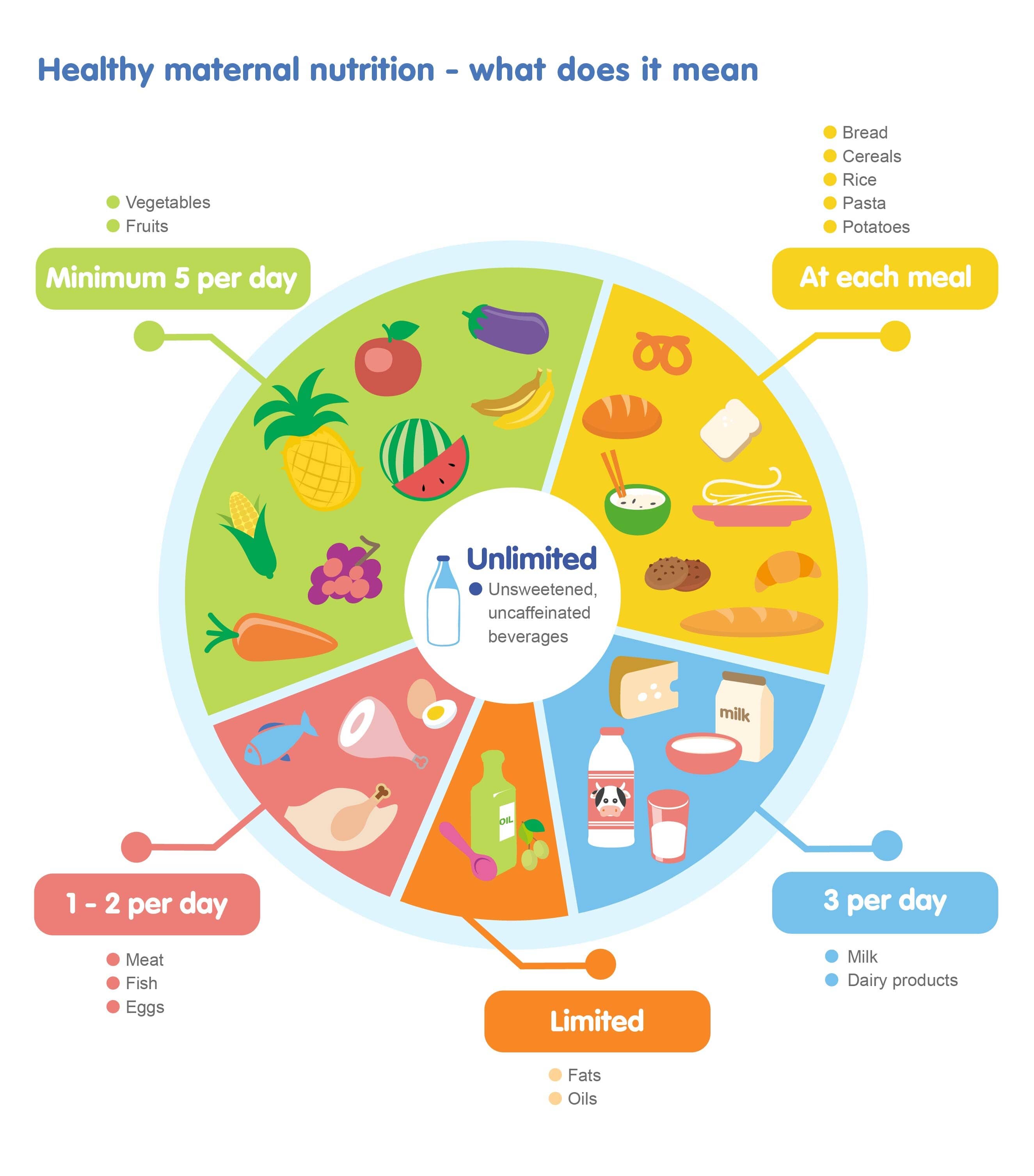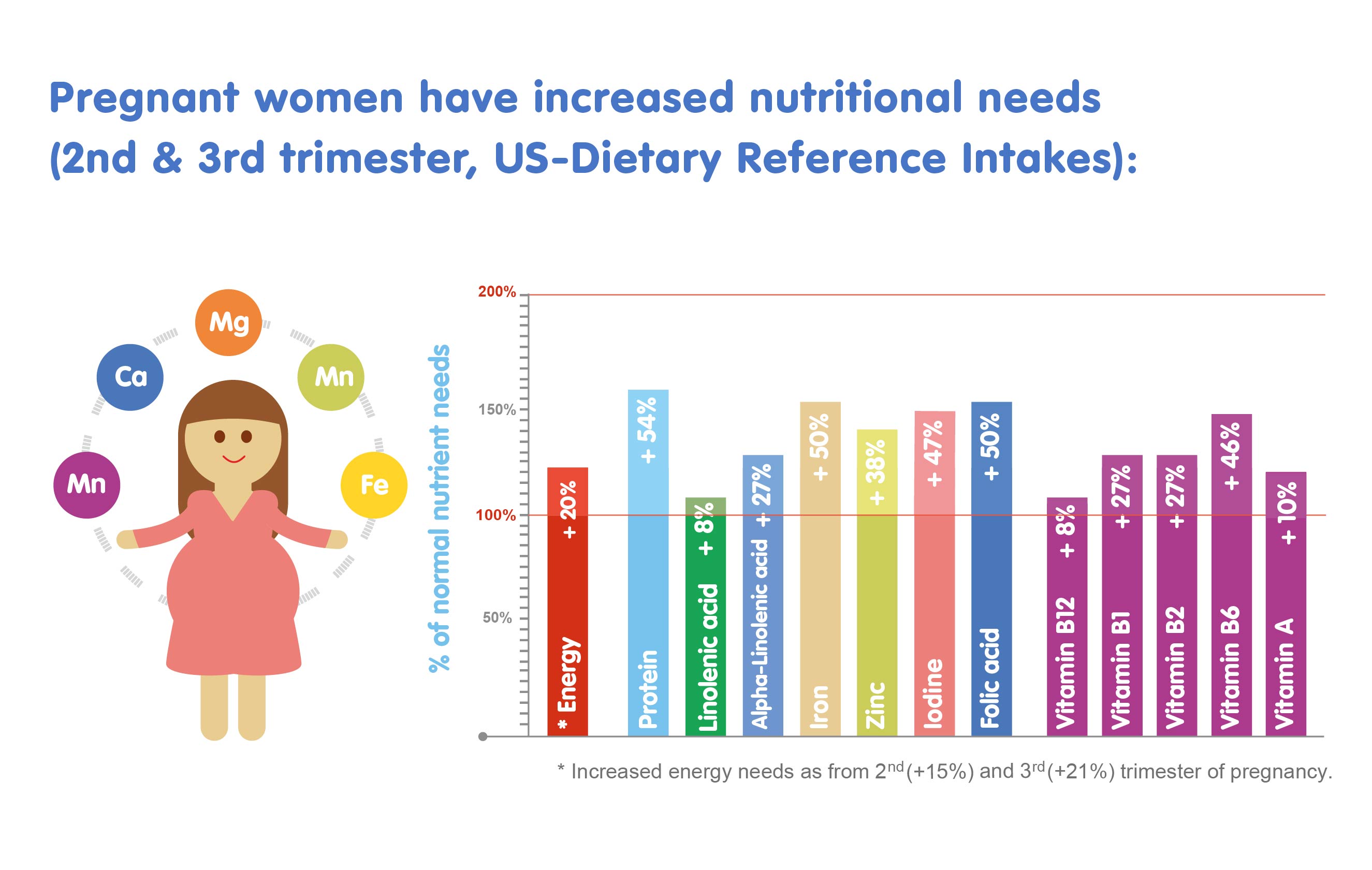
Food choices for a healthy pregnancy
Eating for two doesn’t mean eating twice as much food, but it should mean making your food work twice as hard. Make every calorie count by choosing nutrient-dense foods, in other words get more bang for your calorie buck. By choosing a variety of food from all food groups, you can be assured of a well-balanced diet. But what if you have no appetite some days or occasionally feel nauseous? Remember, a quality diet over several days is what counts, not meal by meal.
What’s the right plan for me?
These food group guidelines, are an easy way to get started on a healthy pregnancy diet. Of course, your beginning weight, height, age, stage of pregnancy and the number of children you are carrying will determine how many calories and how much food you will need.
Typically a woman doesn't need extra calories during the first 3 months of pregnancy. But she will need about 300 extra calories during the second trimester and 450 extra calories during the third trimester.


Nutritional recommendations during pregnancy
التوصيات الغذائية خلال فترة الحمل
| Fruits and/or vegetables | 5/day minimum | At every meal Raw, cooked, plain or processed Fresh, frozen or canned During pregnancy, make sure that they are carefully washed to eliminate any soil traces, and avoid unpasteurised juices. |
| Breads, cereals, potatoes, rice and pasta | At each meal | Choose wholegrain foods Choose a variety of carbohydrates: rice, pasta, semolina, wheat, corn, potatoes, dry beans, chick peas etc. |
| Milk and dairy products | 3/day | Go for variety Choose unflavoured products & the best sources of calcium with the least fat and salt: milk, yoghurts etc. During pregnancy, only eat pasteurised dairy products. Cheese: melted or with the rind removed. |
| Meat, fish and eggs | 1-2/day | Try to eat a smaller portion than that of the side dishes (vegetable, pasta, rice etc.) Meat: try to eat a variety of different meats and choose the least fatty cuts. Fish: at least twice a week, either fresh, frozen or canned. During pregnancy: Fish: at least twice a week, including at least one fish rich in fat and try a variety of different fish. Avoid cold cuts and liver. Avoid fish that contain high levels of mercury (shark, swordfish, king mackerel and tilefish), smoked fish and seafood, and fish from contaminated rivers. 360g/week of low- mercury, fish or seafood (salmon, shrimp, canned light tuna, Pollack and catfish) are safe. Avoid raw meet, smoked meat or marinated and cold cuts (unless they are well cooked). When cooking meat and fish, check the temperature to ensure the meat is well done. |
| Fats and oils | Limit consumption | Try to eat a variety of vegetable oils (olive oil, rapeseed oil etc.) Limit animal fats (butter, cream, etc.) |
| Sweets | Limit consumption | Try to limit sugary drinks (sodas, sugary fruit drinks & nectars) Limit foods with a high fat & sugar content (pastries, pudding, ice cream, chocolate bars, etc.) |
| Drinks | Limit consumption | During & in-between meals, tap water or bottled water. Try to limit sugary drinks (sodas, sugary fruit drinks & nectars) Limit caffeine intake to 200 mg per day. During pregnancy and breastfeeding: No alcoholic drinks & no caffeinated beverages. |
| Salt | Limit consumption | Use iodised salt. Try to limit addition of salt while cooking, and do not add salt before tasting. Limit salty foods: chips, salty appetisers. |
| Physical activities | At least 30 minutes’ walk everyday | During pregnancy, maintain your normal physical activity, except those which represent a risk of falling or injury. Avoid competitions. During pregnancy and breastfeeding, do not begin any new physical activity. |
Surprise!
Healthy fats, in moderation, are good for you. Choose unsaturated fats such as olive oil and nuts, seeds, avocado and salmon for their omega-3 fatty acids.
What is in your plate?
ماذا تضعين في طبقك؟
| Nutrient | For | From |
| Protein | Important for growth and development | Meat, fish, eggs, cheese, beans |
| Carbohydrates | Supplies energy | Pasta, rice, bread, potatoes, vegetables, fruits |
| DHA (docosahexaenoic acid) | Important for brain and eye development | Fish, supplements |
| Probiotics | Gut immuty, allergy prevention | Probiotic product, such as probiotic yogurt, supplement |
| Vitamins | ||
| Folic acid | Prevents from neural tube defects | Dark green leafy vegetables, dried beans, nuts, wholemeal |
| Vitamin B1 (Thiamine) | Important for muscle function and growth | Meat, potatoes, wholemeal products |
| Vitamin B2 (Riboflavin) | Important for metabolism | Dairy products, meat, fish, eggs, wholemeal products |
| Vitamin B12 | Important for maturation of central nervous system | Fish, meat, poultry, dairy |
| Vitamin C | Important for immune system, collagen synthesis | Citrus fruit, peppers, tomatoes |
| Vitamin A | Important for growth and visual function | Carrots, spinach (as beta-carotene) |
| Vitamin D | Building bones | Fish, eggs yolks |
| Vitamin E | Muscles, antioxidant | Wheat germ oil, wholemeal products |
| Minerals & trace elements | ||
| Calcium | Important for bone and teeth formation | Milk, cheese, dairy products, broccoli |
| Magnesium | Regulates energy metabolism, nerve transmission, muscular contraction | Nuts, seed, wholemeal, vegetables |
| Iron | Important for increase in blood volume | Meat, spinach, lentils |
| Iodine | Growth metabolism | Fish, iodized salt |
| Selenium | Antioxidant | Meat, fish, egg, lentils, aspargus |
| Zinc | Growth, immune system | Meat, dairy products, fish |

